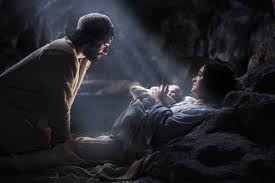"The Word became flesh
and made his dwelling among us,
and we saw his glory,
the glory as of the Father's only Son,
full of grace and truth."
(Jn 1:14)
and made his dwelling among us,
and we saw his glory,
the glory as of the Father's only Son,
full of grace and truth."
(Jn 1:14)
But why?? The greatest summary of the Christian faith in the last 400 years, the Catechism of the Catholic Church, is over 800 pages--subdivided into four sections with dozens of chapters and over 2800 numbered paragraphs. Though it contains countless brilliant passages from the Scripture and Tradition of the Church, one particularly beautiful section focuses on the reasons for the Incarnation of the Son of God (Paragraphs #457-460):
1. The Word became flesh for us in order to save us by reconciling us with God, who “loved us and sent his Son to be the expiation for our sins”: “the Father has sent his Son as the Savior of the world,” and “he was revealed to take away sins”: Sick, our nature demanded to be healed; fallen, to be raised up; dead, to rise again. We had lost the possession of the good; it was necessary for it to be given back to us. Closed in the darkness, it was necessary to bring us the light; captives, we awaited a Savior; prisoners, help; slaves, a liberator. Are these things minor or insignificant? Did they not move God to descend to human nature and visit it, since humanity was in so miserable and unhappy a state?
2. The Word became flesh so that thus we might know God’s love: “In this the love of God was made manifest among us, that God sent his only Son into the world, so that we might live through him.” “For God so loved the world that he gave his only Son, that whoever believes in him should not perish but have eternal life.”
3. The Word became flesh to be our model of holiness: “Take my yoke upon you, and learn from me.” “I am the way, and the truth, and the life; no one comes to the Father, but by me.” On the mountain of the Transfiguration, the Father commands: “Listen to him!” Jesus is the model for the Beatitudes and the norm of the new law: “Love one another as I have loved you.” This love implies an effective offering of oneself, after his example.
4. The Word became flesh to make us “partakers of the divine nature”: “For this is why the Word became man, and the Son of God became the Son of man: so that man, by entering into communion with the Word and thus receiving divine sonship, might become a son of God.” “For the Son of God became man so that we might become God.” “The only–begotten Son of God, wanting to make us sharers in his divinity, assumed our nature, so that he, made man, might make men gods.”
No wonder the Church has cried out down through the centuries: "Joy to the world!" May the Christ Child continue to transform the world this Christmas season--
Pax et Bonum,
David
David
P.S. If you have 10 minutes to spare, here's the single best commentary I've come across on The Tragedy at Newtown, from Fr. Robert Barron.
